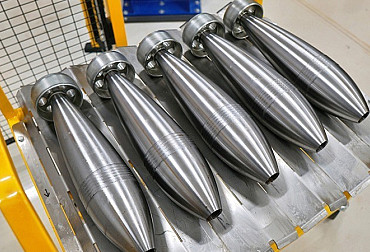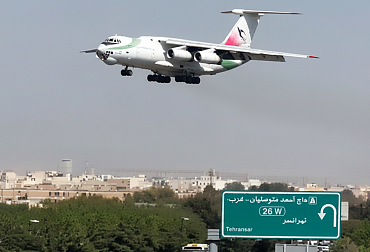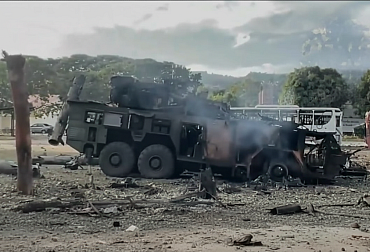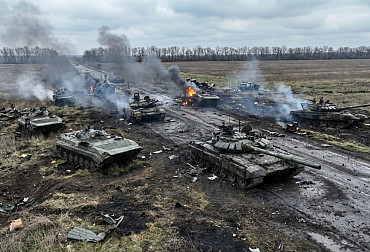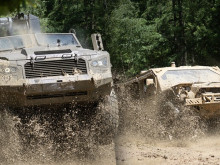Admiral Rob Bauer: While armies win battles, the economy wins the war
On September 13–15, the NATO Military Committee held a retreat in Prague. The Committee meets three times a year at the level of the Chiefs of Defence Staff, including twice at the Alliance headquarters in Brussels, Belgium. This is the first time it has been held in the Czech Republic. The meeting, chaired by NATO Military Committee Chairman Admiral Rob Bauer, discussed the current security situation in Europe, NATO's defence plans, and the implementation of the conclusions from the Washington Summit. The Czech Army was represented by the Chief of the General Staff of the Czech Armed Forces, Lieutenant General Karel Řehka.
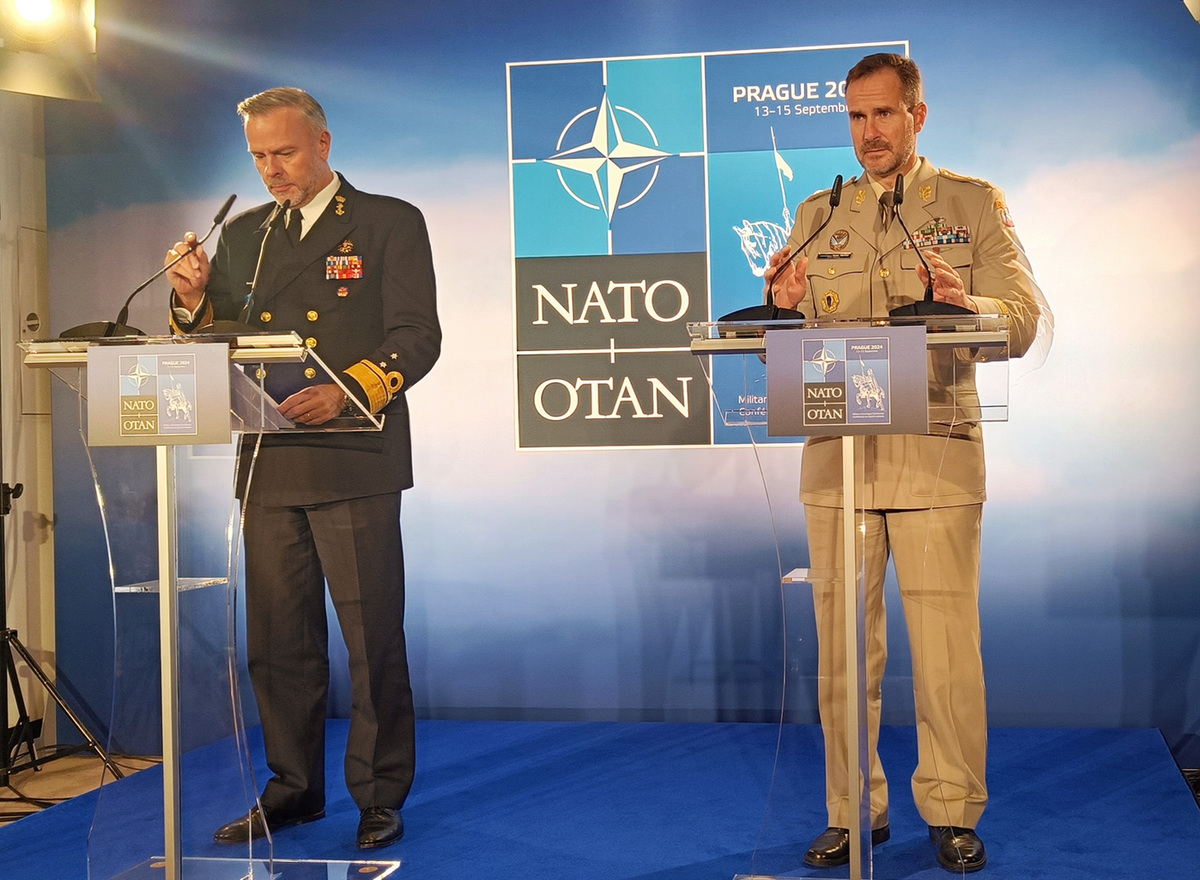
This extraordinary summit for the Czech Republic was opened by the President of the Republic, Petr Pavel, who was the Chairman of the NATO Military Committee from 2015 to 2018. In his speech, President Pavel stated that the world is no longer defined by the rivalry between the West and the East, but increasingly by the competition between democracy and various forms of autocracy. "While we stand for the values of democracy, individual freedom, the rule of law, and human rights, these values are being challenged by our opponents. Not only traditional ones, such as Russia, but also China, North Korea, and Iran," the President said. "And many others are watching to see how this rivalry plays out. So it is up to us to show that our model is more worthy of emulation than that of autocracies," Pavel added. The President also urged the Chiefs of Staff of NATO countries to be bold and transparent in their conclusions and recommendations so that these can be understood at the political level. According to Pavel, the current situation does not allow for political correctness. The North Atlantic Alliance, in his view, remains the most successful and long-standing military alliance in the world. However, he emphasized that while it is not perfect, continued improvement is necessary to maintain its role as a zone of stability, security, and prosperity.
Lieutenant General Karel Řehka, Chief of the General Staff of the Czech Armed Forces, emphasized that with increasing challenges and demands, it is clear that in the future, spending 2% of GDP on defence will no longer be sufficient. In his morning address, Řehka also highlighted that the Allies must provide Ukraine with all necessary assistance, including training, weapon supplies, and other military material. "By supporting Ukraine, we are also strengthening our unity and defending ourselves against the Russian threat," General Řehka said, stressing that for Ukraine, this is a war for survival but also a fight for the principles of democracy, sovereignty, and territorial integrity.
NATO Military Committee Chairman Admiral Rob Bauer emphasized the need to increase the production capacity of the defence industry. "The military may win battles, but the economy wins wars," he said during a speech at the opening of the NATO Military Committee meeting in Prague. Bauer further explained that NATO has two tasks to perform simultaneously: to continue supporting Ukraine and to strengthen its own deterrence and defence capabilities. "The more the Allies coordinate their defence production, the stronger the deterrence capability. The stronger the deterrence capability, the better chance we have of protecting the freedoms we enjoy and preventing the war from spilling over onto our soil," Bauer stated. Increasing production capacity, he said, must be driven by conviction, not coercion.
At the evening press conference, Admiral Bauer reiterated the key points of the meeting. He reaffirmed the commitment to strengthen and expand support for Ukraine, while also highlighting the need to bolster NATO's own deterrence and defence. "We have made significant strides over the past year. NATO now has 500,000 troops on high alert. We have established an Allied rapid reaction force, adapted our command and control structure, and Allies are rapidly expanding their capabilities. Training and exercises are crucial. This year, the Alliance hosted the largest exercise since the end of the Cold War, Steadfast Defender, with over 90,000 troops from across the Alliance training in Germany, Poland, and the Baltic States," the Admiral said. He also mentioned that the Chiefs of Staff discussed how strong deterrence requires not only a robust defence industry but also a resilient society and economy. "Peace is no longer a given, and private companies also play a role in deterrence and defence. Armies may win battles, but the economy wins wars. Nowhere is this more evident than in the war in Ukraine," Admiral Bauer said at the press conference.
Lieutenant General Karel Řehka also stated at the press conference that this meeting is symbolic for the Czech Republic. Not only is NATO celebrating its 75th anniversary this year, but the Czech Republic is also marking the 25th anniversary of joining the Alliance. Řehka highlighted three important themes. The first is the intensive and robust support for Ukraine through training, consultations, and equipment provision. "The second topic I would like to highlight is the hybrid threats from the Russian Federation. Our assessment shows an increase in these activities, and the overall trend is concerning. This presents a challenge not only for the military but for society as a whole. Many of these acts fall outside the military's area of responsibility, but they directly impact our ability to execute our plans," the Chief of Staff said. The third topic, according to Řehka, is the implementation of the outcomes of the recent NATO summit, especially concerning the feasibility of regional plans and the NATO force model. He noted that the Czech Army is revising its defence plans and modernizing its training and operations. "All of this is being done to ensure we contribute effectively to collective defence," said Lieutenant General Řehka.
Admiral Bauer also addressed the debate regarding restrictions on the use of weapons provided to Ukraine. For example, Italy has imposed such restrictions, while countries like the Czech Republic, Sweden, and the Netherlands do not. Russian President Vladimir Putin warned that NATO would find itself at war with Russia if the West allowed Ukraine to attack targets deep within Russian territory. According to Admiral Bauer, this debate has two aspects. "First, under the law of armed conflict, any nation that is attacked has the right to defend itself. This right does not end at the borders of one's own state. You are allowed to strike an attacking nation to weaken its military, logistical lines, fuel, or ammunition supplies. There is a strong military and legal rationale for doing so," Bauer said.
The second aspect of the debate, Bauer explained, is that if countries provide Ukraine with weapons systems, they are within their rights to impose conditions on how those weapons are used, as they feel responsible for them. "However, this is a political issue," Bauer added. General Řehka also supported this view, stating that it is legitimate and legal to strike targets on Russian territory as long as it complies with international law and the law of armed conflict. "I have publicly stated several times, and it is also the policy of the Czech Republic, that we do not place restrictions on the use of any weapons we provide to Ukraine. We believe that the Ukrainians should determine how to use them," General Řehka said.
Approximately 350 foreign guests attended the NATO Military Committee retreat. The main objective of the meeting was to discuss the current security situation in Europe, the Alliance's defence plans, and the implementation of the conclusions from the July NATO Summit in Washington.











